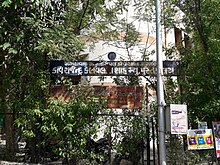Rajendra Shah (author)
Rajendra Shah | |
|---|---|
 | |
| Born | 28 January 1913 Kapadvanj, Bombay Presidency, British India |
| Died | 2 January 2010 (aged 96) Mumbai, Maharashtra, India |
| Occupation | Author |
| Nationality | Indian |
| Alma mater | MSU Baroda |
| Period | 1947-2003 |
| Notable works |
|
| Notable awards |
|
Rajendra Keshavlal Shah (28 January 1913 – 2 January 2010) was a lyrical poet who wrote in Gujarati. Born in Kapadvanj, he authored more than 20 collections of poems and songs, mainly on the themes of the beauty of nature, and about the everyday lives of indigenous peoples and fisherfolk communities. In his poems using Sanskrit metrics, he was influenced by Rabindranath Tagore. He is considered one of the giants of post Gandhi-era in Gujarati literature.[1]
Among his various professions, Shah was also a publisher in Mumbai, where he launched the poetry magazine Kavilok in 1957.[2] The press itself became an important Sunday meeting-place for Gujarati poets. Apart from writing poetry, Shah also translated into Gujarati Tagore's poetry collection Balaaka; Jayadeva's Gita Govinda; Coleridge's The Rime of the Ancient Mariner; and Dante's The Divine Comedy.[3]
Shah won the Jnanpith Award for 2001.
Biography
[edit]Shah was born in 1913 in Kapadvanj, a town in the erstwhile Bombay Presidency of British India (in present-day Kheda district of Gujarat, India). After attending Wilson College in Mumbai, he graduated with a degree in philosophy from the Maharaja Sayajirao University of Baroda. Shah's first poem came in print in Wilsonian, the college magazine of the Wilson College, in 1933.[4]
In 1930, he discontinued from the study, as he was arrested in Civil disobedience movement and sentenced to the jail. In 1931, he married Manjula Agrawal.[5] Later, in 1934, he earned his bachelor's degree in philosophy from The Maharaja Sayajirao University of Baroda, and thereafter, started his career by teaching school students in Ahmedabad.[6]
He died on 2 January 2010 in Mumbai.[7]
Bibliography
[edit]Poetry collections
[edit]- Dhvani (1951)
- Andolan (1952)
- Shruti (1957)
- Morpinchh (1959)
- Shant Kolahal (1962)
- Chitrana (1967)
- Kshan je Chirantan (1968)
- Vishadne Saad (1968)
- Madhyama (1978)
- Ikshana (1979)
- Udgiti (1979)
- Patralekha (1981)
- Prasang Saptak (1982)
- Dwasupama (1983)
- Panch Parva (1983)
- Vibhavan (1983)
- Chandan Bhini and Anamik (1987)
- Aranyak (1992)[8]
- Smritisamvedana (1998)
- Virahmadhuri (1999)
- Vrajvaikunthe (2002)
- Ha... Hu Sakshi Chhu' (2003)
- Premno Paryay (2004)
- Aa Gagan (2005)
Awards
[edit]
He won Kumar Chandrak in 1947, Ranjitram Suvarna Chandrak in 1956. He received Sahitya Akademi Award (1963) for his book Shant Kolahal.[9] He is also a recipient of Aurobindo Suvarna Chandrak presented (1980) by Gujarati Sahitya Parishad, Sahitya Gaurav Puraskar (1992) and Narsinh Mehta Award (1999). He received Jnanpith Award, considered to be India's highest literary award, in 2001. The judges noted, "his intensity of emotion and innovation in form and expression which set him apart as a poet of great significance. The mystical tone of his poetry stems from the tradition of great medieval masters like Narsinh Mehta, Kabir and Akho."[10][3]
References
[edit]- ^ Mehta, Deepak B. (August 2003). "In love with the world". Frontline. 20 (16).
- ^ Lal, Mohan, ed. (1992). "Shah, Rajendra Keshavlal". Encyclopaedia of Indian Literature. Vol. 5 (2001 ed.). Delhi: Sahitya Akademi. pp. 3944–45.
- ^ a b Shah, Rajendra Keshavlal (25 July 2003). "'I Write What My Inner Voice Says'". Outlook (Interview). Interviewed by Darshan Desai. Retrieved 9 January 2013.
- ^ Oza, Nandini (27 July 2003). "His poetry is from 'within'". Deccan Herald. Archived from the original on 27 December 2003. Retrieved 22 November 2021.
- ^ "Meet the Author: Rajendra Shah" (PDF). Sahitya Akademi. Retrieved 19 September 2017.
- ^ Suguna Ramanathan and Rita Kothari (1998). Modern Gujarati Poetry: A Selection. New Delhi: Sahitya Akademi. p. 85. ISBN 81-260-0294-8.
- ^ "Gujarati poet Rajendra Shah(97) passes away". DeshGujarat News from Gujarat. 3 January 2010. Retrieved 9 February 2017.
- ^ "Third Gujarati to win Jnanpith". The Hindu. New Delhi. 18 July 2003. Archived from the original on 18 September 2003. Retrieved 12 October 2018.
- ^ Jani, Jyotish (1992). "Shant Kolahal". In Lal, Mohan (ed.). Encyclopaedia of Indian Literature. Vol. 5 (2001 ed.). Delhi: Sahitya Akademi. p. 3972.
- ^ Mehta, Harit (19 July 2003). "At 90, Jnanpith winner Rajendra creative as ever". The Times of India. Ahmedabad. Archived from the original on 16 February 2013. Retrieved 9 January 2013.
External links
[edit]- Rajendra Shah (author) on GujLit
- 1913 births
- 2010 deaths
- Gujarati-language writers
- Gujarati-language poets
- Maharaja Sayajirao University of Baroda alumni
- 20th-century Indian translators
- Indian editors
- Writers from Gujarat
- 20th-century Indian poets
- Recipients of the Jnanpith Award
- Indian independence activists from Gujarat
- Recipients of the Ranjitram Suvarna Chandrak
- Recipients of the Sahitya Akademi Award in Gujarati
- Presidents of the Gujarati Sahitya Parishad
